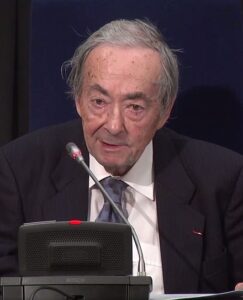Errata; an Examined Life: A Life in Ideas by George Steiner; Yale University Press, 1998
By Dorothea Shefer-Vanson


MEVASSERET ZION, Israel — The name of this author arouses reverence in the minds of anyone conscious of the role played by language in the world of culture, literature and ideas. Steiner’s seminal books, After Babel and Language and Silence, occupy pride of place on my bookshelf and that of anyone concerned with translation and the history of ideas. So. it was with bated breath that I embarked on reading one of Steiner’s last books, a kind of summing-up of his life and work. A telling sign – the only image on the rather plain cover of the book is a small Star of David, the symbol of the Jew.
The book starts out as if it were a memoir, describing the tedium of childhood holidays spent in the verdant Austrian countryside where the constant downpour kept the young George inside the house. Relief came in the form of a book of heraldry bought by an uncle, which fascinated the child and led him to an instinctive awareness of individuation rather than theory.
Born in 1929, George Steiner’s early childhood was spent in Paris in a family where French, German and English were all spoken. Faced with the threat of invasion by Nazi Germany, his father, a successful economist who taught his son Greek and Latin, took the family to the USA, where George was enrolled in the French Lycée in Manhattan. While there, alongside the children of diplomats and other Jewish emigrés, he was introduced to the work of Shakespeare and the English and American poets, while acknowledging the supremacy of modern French literature. His polyglot upbringing led him to an awareness of language and literature as cultural agents (and his cognizance of the work of the translator as ‘honest treason’).
Steiner, who died in 2020 and has been described as a ‘polyglot and polymath,’ gives an entertaining account of his time in the late 1940s at the University of Chicago, sharing a room with an ex-paratrooper who stunned the young George with his physical prowess and arranged for his sexual initiation (by a kindly prostitute), requiring solely some tutoring in academic subjects in return. It was not long before young George found himself tutoring groups of students, and thus found his calling as a teacher, enabling others to understand texts that they found impenetrable.
Devoting an entire chapter to the State of Israel, Steiner describes the attendance of prominent international figures at the funeral of assassinated Prime Minister Yitzhak Rabin and then ruminates on the ‘anomaly of Jewish survival’ as so many great ancient civilizations have disappeared. Defining modern Israel as an ‘indispensable miracle,’ he tries to explain Jewish survival as a combination of ethical values, adherence to traditional practices, and strong family bonds. Steiner notes that Jews continue to persist despite millennia of persecution and pogroms which culminated in the Shoah, and that Jews in Israel still adhere to their ancient language, produce exceptional scholars and scientists and are no longer ‘unwelcome guests’ in other countries.
Music has played an important part in Steiner’s life, providing both solace and an area of study. He asserts that talking about music sets the boundaries of language, and he regards it as a meta-language, affecting human consciousness (as exemplified in the writings of Proust, Mann, Joyce, for example) and, evidently speaking from experience, regarding it as something without which life on earth would probably be unbearable for many. Steiner also extolls the virtues of growing up in a bi-lingual or multi-lingual environment, serving to open additional ‘windows on the world’ and castigates those who insist that monolingualism is better for a child. Contemporary culture is based on translation, he claims, citing the instances of the Bible and Roman Law. He does not regard machine translation as a threat to the human translator except in the case of routine and technical texts.
Steiner regards the 20th century as ‘the most bestial in recorded history’ even though death and destruction have always been prevalent throughout human existence. The greatest scientific advances have been made in that century, with the widespread improvement in social conditions, medicine and communications. He mentions teachers who have made an impression on him from his schooldays to his time at various universities throughout the world, and also credits certain students with having stimulated his thinking on various subjects. He writes with affection about places he has visited, bookshops he has frequented and with regret about mistakes he has made (due to pressure of time or deadlines). He is sorry that he did not continue to draw or paint, did not learn Hebrew and did not try LSD.
Altogether, reading this book is an exciting and stimulating journey into the mind and life of one of the leading thinkers of our time, and almost as soon as I had finished reading it I resolved to read it once again, as there are so many profound and interesting insights into the world of ideas that it is impossible to absorb everything at the first reading.
*
Dorothea Shefer-Vanson is an author and freelance writer based in the Jerusalem suburb of Mevasseret Zion, Israel. She may be contacted via dorothea.shefer@sdjewishworld.com